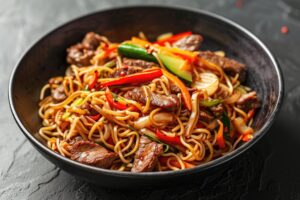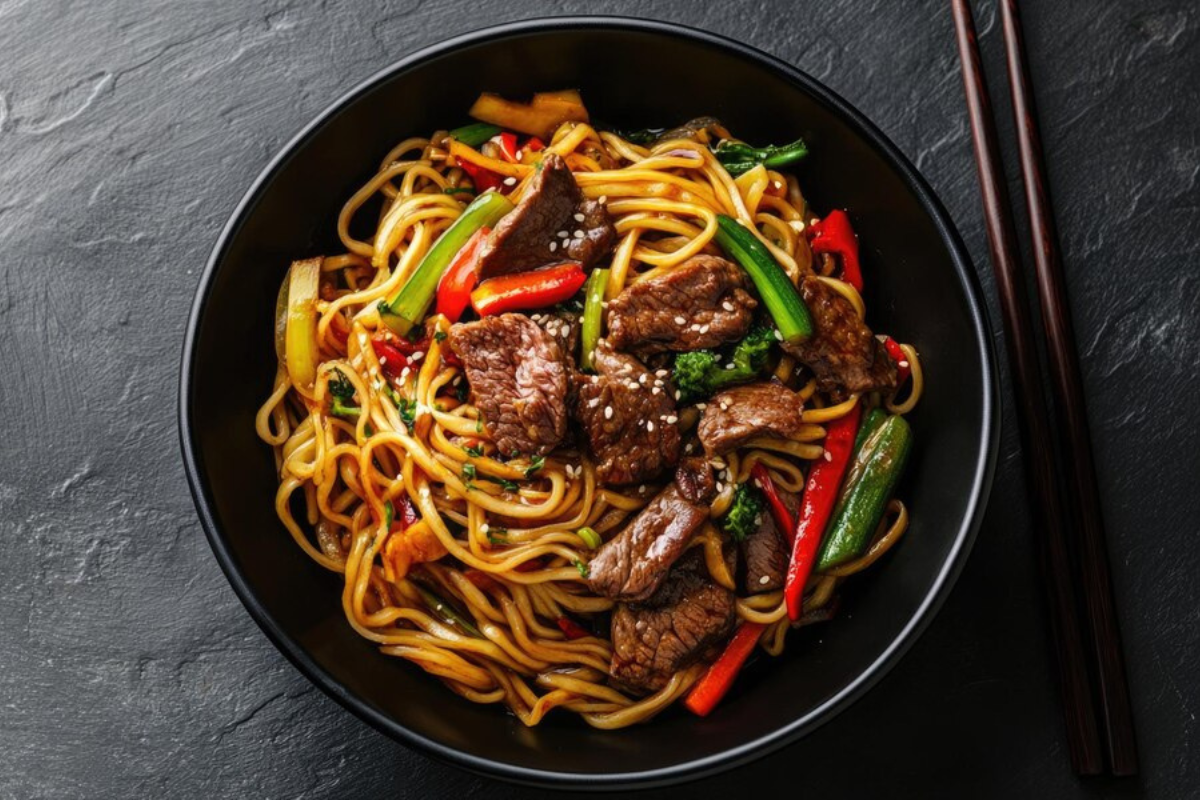When you find yourself with extra beef and noodles, the thought of freezing the leftovers might cross your mind. Freezing is a great way to save time and reduce food waste. But can you freeze beef and noodles without sacrificing flavor or texture? The short answer is yes, you can, but there are a few important techniques to follow to ensure the best results.
In this comprehensive guide, we’ll cover everything you need to know about freezing beef and noodles from preparing your dish for freezing, to the proper thawing and reheating techniques. Whether it’s beef stroganoff, beef tips with noodles, or a beef and noodle stir-fry, we’ll provide you with actionable tips to maintain quality, taste, and texture.
Can You Freeze Beef and Noodles?
Absolutely, you can freeze beef and noodles! However, understanding the proper methods is key. Both beef and noodles tend to behave differently when frozen and reheated, and without the right approach, the noodles can turn mushy while the beef may dry out.
Key Considerations for Freezing Beef and Noodles:
- Freeze cooked meals: The best way to freeze beef and noodles is after they’ve been cooked. However, ensure they are cooled before freezing.
- Freeze in portions: Rather than freezing a large batch, divide your meal into smaller portions. This makes it easier to defrost only what you need.
- Proper containers are essential: Airtight, freezer-safe containers or heavy-duty freezer bags will prevent freezer burn and keep your meal tasting fresh.
Freezing meals like beef and noodles isn’t just about preserving the food—it’s also about retaining its flavor, texture, and nutritional value.
If you’re also interested in other beef recipes, check out this detailed guide on beef chuck roast—from choosing the cut to cooking it right.
Why Should You Freeze Beef and Noodles?
Freezing beef and noodles is not just about convenience; it also ensures that your leftovers don’t go to waste. Plus, freezing meals ahead of time can be a lifesaver for busy days.
Benefits of Freezing Beef and Noodles:
- Convenience: Preparing large batches of food and freezing individual portions can save you time during the week.
- Reducing Food Waste: Freezing leftovers helps cut down on food waste and ensures that nothing is thrown away.
- Meal Prep: Freezing your meals in advance can simplify weeknight dinners, allowing you to enjoy home-cooked meals without spending hours in the kitchen.
Explore more ways to prepare meals ahead with ground beef—a comprehensive guide, where you can find more recipes and tips for freezing beef-based dishes.
How to Freeze Beef and Noodles Correctly ?

Follow these key steps before freezing beef and noodles to ensure they stay delicious even after being frozen and reheated. Here’s a step-by-step guide:
Step 1: Cool the Food Completely
Before placing your beef and noodles in the freezer, allow them to cool to room temperature. Freezing hot food can cause condensation, leading to freezer burn or unwanted ice crystals, which will alter the texture of both the beef and the noodles.
Tip: Let your food sit on the counter for 30 minutes before transferring it into the freezer.
Step 2: Choose Proper Storage Containers
Selecting the right storage container is crucial to prevent freezer burn and to keep your food fresh. Use airtight, freezer-safe containers or heavy-duty freezer bags. If using bags, make sure to press out as much air as possible to prevent oxidation, which can affect the flavor.
- Freezer Bags: These are great for saving space in the freezer and are easily stackable.
- Airtight Containers: Ideal if you prefer sturdier storage options that provide more protection for your food.
Step 3: Label and Date Your Containers
Always label your containers with the type of dish and the date you froze it. This ensures you consume the meal within a safe timeframe. Beef and noodles can typically be frozen for up to three months before the quality starts to decline.
Tip: Consider writing reheating instructions on the label as well, so you know exactly how to prepare the meal when you’re ready to eat it.
Step 4: Store in Portions
Instead of freezing a large amount in one container, divide the meal into individual portions. This not only helps with quicker defrosting, but also ensures that you’re only thawing the amount you need.
How to Thaw and Reheat Frozen Beef and Noodles
Once you’re ready to enjoy your frozen beef and noodles, thawing and reheating the meal properly is critical to maintaining its texture and flavor. Here are the best ways to defrost and reheat your frozen meal.
Thawing Methods:
- Refrigerator Thawing: The safest way to thaw beef and noodles is by moving it from the freezer to the refrigerator. This method takes longer (about 24 hours), but it ensures the meal thaws evenly and maintains its quality.
- Microwave Thawing: If you’re in a hurry, you can use the defrost setting on your microwave. Be sure to stir the food occasionally during thawing to ensure even defrosting.
Reheating Methods:
- Stovetop Method: Reheat beef and noodles in a saucepan over low heat. Add a splash of broth or water to the dish to prevent the noodles from drying out. Stir occasionally to ensure even heating.
- Microwave Method: If you prefer the microwave, use medium power and reheat in short intervals, stirring in between to prevent uneven heating.
Pro Tip: If your noodles seem a bit dry after reheating, you can add a little butter or broth to bring back their moisture and texture.
For more tips on reheating and freezing meals, explore the best ways to freeze chicken broccoli rice casserole—another great meal-prep option.
Freezing Noodles Separately
One of the main challenges when freezing beef and noodles together is that the noodles can become mushy during freezing and reheating. To avoid this, consider freezing the noodles separately from the beef.
Here’s how to freeze them individually:
- Cook the Noodles Al Dente: Slightly undercook the noodles to al dente before freezing. This helps preserve their texture when reheating.
- Separate Storage: Store the beef and noodles in separate containers or bags.
- Reheat Separately: When ready to eat, reheat the beef and noodles individually before combining them. This ensures both are heated evenly without compromising the quality.
Freezing the noodles separately gives you more control over the texture and prevents them from becoming too soft or mushy after thawing.
Best Practices for Freezing Different Types of Noodles
Not all noodles are created equal when it comes to freezing. Here’s a look at how different types of noodles hold up:
- Egg Noodles: These are common in beef dishes like stroganoff and hold up relatively well after freezing. However, they can still become slightly softer than fresh.
- Pasta Noodles: Spaghetti, fettuccine, and other pasta noodles can freeze well but should be undercooked before freezing to avoid becoming mushy during reheating.
- Rice Noodles: These are a bit more fragile and tend to break down more easily when frozen, so it’s best to avoid freezing dishes with rice noodles.
Recipes You Can Freeze Along with Beef and Noodles
If you’re looking to batch-cook and freeze other beef and noodle dishes, here are some ideas that freeze beautifully:
- Beef Stroganoff: This classic comfort food is perfect for freezing. Just be sure to freeze the sauce separately from the noodles if possible.
- Beef Tips and Noodles: A hearty dish that freezes well and can be reheated for a quick dinner.
- Beef Noodle Soup: Soups generally freeze well, and beef noodle soup is no exception. Make sure to freeze the noodles separately from the broth to avoid them becoming mushy.
For more beef-based recipes that are perfect for freezing, check out how to make beef stroganoff with ground beef.
Common Mistakes to Avoid When Freezing Beef and Noodles
Freezing meals can be a huge time-saver, but there are a few common mistakes that can ruin the flavor and texture of your meal.
Freezing Hot Food
Never place hot food directly into the freezer. Doing so can cause condensation to form inside the container, leading to ice crystals and freezer burn. Always cool your food to room temperature before freezing.
Using the Wrong Containers
Using thin plastic containers or bags that aren’t airtight can cause your food to dry out. Make sure to invest in quality, freezer-safe containers or bags to prevent this.
Keeping Food Frozen for Too Long
While beef and noodles can last up to three months in the freezer, it’s best to consume them within this period. Freezing for longer can cause the meal to lose its flavor and texture.
Not Labeling Your Freezer Meals
Labeling your meals with the freezing date might seem unnecessary, but it ensures you remember how long they’ve been stored.
FAQs
1. Can You Freeze Beef Stroganoff with Noodles?
Yes, you can freeze beef stroganoff with noodles, but to maintain the best texture, freeze the sauce and noodles separately. This prevents the noodles from becoming too soft during thawing and reheating.
2. How Long Can Beef and Noodles Be Stored in the Freezer?
You can store beef and noodles in the freezer for up to three months. After this point, the quality starts to degrade, but the meal remains safe to eat if you store it properly.
3. Is It Safe to Freeze Noodles, and How Do They Hold Up After Reheating?
Yes, you can freeze noodles, but they may become a bit softer after reheating. Cooking them al dente before freezing can help maintain their texture.
4. Can I Refreeze Beef and Noodles After Thawing?
Avoid refreezing beef and noodles after thawing. Refreezing can degrade the texture and increase the risk of bacterial growth.
5. What’s the Best Way to Prevent Freezer Burn on Beef and Noodles?
To avoid freezer burn, use airtight containers or heavy-duty freezer bags. Squeeze out as much air as possible before sealing, and make sure the food has cooled completely before freezing.
Conclusion
Freezing beef and noodles is an excellent way to save time, reduce waste, and ensure you have a ready-made meal on hand whenever you need it. By following the proper freezing, thawing, and reheating techniques outlined in this guide, you can enjoy delicious, freezer-friendly meals without compromising on flavor or texture.
So the next time you have extra beef and noodles, go ahead and freeze them confidently, knowing you have the tools to keep them fresh and tasty for months to come.

